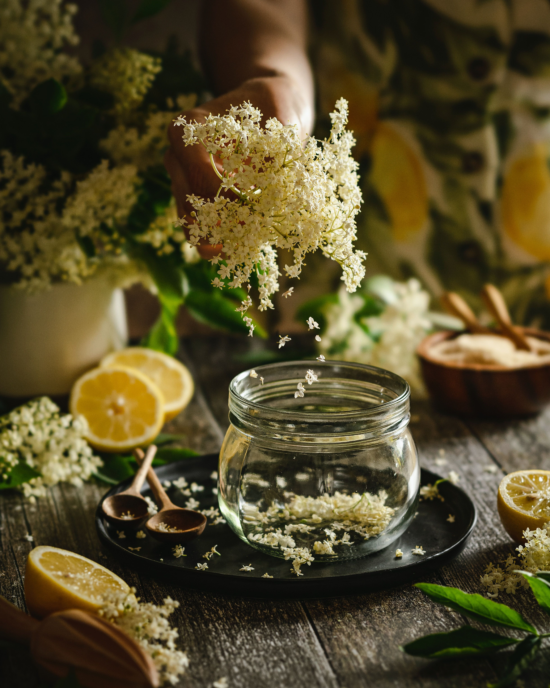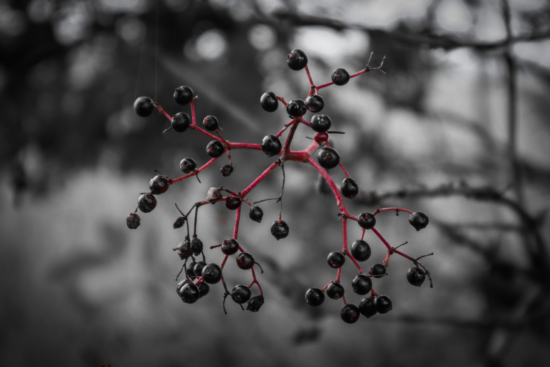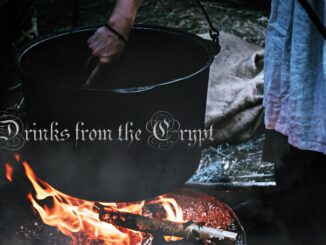![Elderflower_cover_photo[1]](https://www.baristamagazine.com/wp-content/uploads/2023/03/Elderflower_cover_photo1-678x381.webp)
The elder tree has long been considered sacred across Northern Europe; today we explore two of its ingredients’ flavor profiles, and how to incorporate them into your beverages at home or on bar.
BY EMILY MENESES
BARISTA MAGAZINE ONLINE
Featured photo courtesy of Toby Schumacher via Unsplash
With hints of spring emerging here in the Northern Hemisphere, ingredients like rose, jasmine, and lavender are on everybody’s minds. While you can’t go wrong with these favored florals, there are many other ingredients to explore as well! In today’s installment of “Know Your Ingredients,“ we’re turning our attention to elderflower and elderberry, which both come from the elder tree (Sambucus nigra).
The elder tree typically grows as a shrub or small tree in woodland areas or along riverbanks—anywhere where water is abundant and the soil is wet and fertile. While elderberries ripen at the start of autumn, elderflowers bloom in the late spring. Both flowers and berries have wonderful flavor profiles and healing benefits to offer.

Ancient Uses
Since ancient times, the elder tree and its flowers and fruit have been seen as magical and sacred—especially across Northern Europe. The Druids saw the elder tree as a gift from Mother Earth, believing nature spirits lived within it. Flowers and twigs were placed around households or worn as jewelry, believed to provide protection. Elder wine, concocted from elderberries, was believed to strengthen clairvoyant abilities and induce psychic visions when consumed. William Shakespeare is also known for mentioning the elder tree often in his work.
Flavor Profiles
Elderflower has a unique flavor profile. It’s soft and subtle, fresh and fruity, with notes reminiscent of pear and lychee. In beverages, you’ll typically find elderflower paired with light teas—such as white tea or certain types of oolong tea—and other fruits and herbs, such as pear, blackberry, rosemary, or basil.

Compared to elderflower, elderberry has a more intense taste: woodsy and floral, with a dark flavor that can be bitter and earthy when the fruit is consumed raw. When elderberries are cooked, some sweetness comes out. The fruit makes a great syrup that pairs well with dark teas or other floral flavors like rose or lavender.
Medicinal Properties
Elderberries are famous for their healing properties, and are often used to help ease symptoms of the cold and flu. Both elderberries and elderflowers are laden with antioxidants and immunity-boosting vitamins. We love this immunity-boosting elderberry syrup recipe, which includes other ingredients that are great for treating cold and flu symptoms, such as ginger and honey.

Elderflower and Elderberry at Your Café
While elderflower is great in cocktails, there’s nothing stopping you from incorporating it into your café drinks, by infusing iced teas with elderflower or making elderflower lemonade (check out this recipe!). Elderberry is a great choice for anyone looking to infuse their recipes with some health benefits.
Adding elderflower or elderberry to your drink repertoire is a great way to celebrate the arrival of spring and add life to your menu through new and unique flavors.
ABOUT THE AUTHOR
Based in Los Angeles, Emily Meneses (she/her) is a writer and musician passionate about culture and collective care. You can regularly find her at Echo Park Lake, drinking a cortado and journaling about astrology, art, Animal Crossing, and her dreams.



